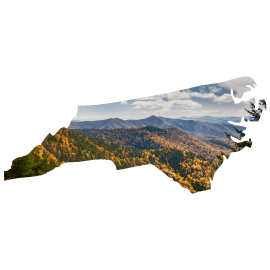Secondary Teacher Preparation in Social
Studies: North Carolina
Delivering Well Prepared Teachers Policy
Analysis of North Carolina's policies
North Carolina offers a secondary teaching licensure area in comprehensive social studies. Coursework requirements are unclear, as the state seems to rely on the HQT requirement of an undergraduate major, while North Carolina's standards articulate that high school teachers must "have depth in one or more specific content areas or disciplines." Regrettably, North Carolina does not require content tests for initial licensure; such tests are only mandated once candidates apply for the standard professional 2 license, usually after three years. At that point, candidates must pass the Praxis II "Social Studies" content test. Interestingly, however, the state does not require a minimum score. Rather, candidates must earn a certain combined score from the content test and the social studies pedagogy test. Teachers with this license are not limited to teaching general social studies but rather can teach any of the topical areas. Further, although North Carolina offers additional licensure areas in specific areas of social studies, such as geography, history and sociology, the state still only requires the general content test and similarly combines its score with the pedagogy test.
Middle school social studies teachers in North Carolina have the option of earning a middle grades science certificate. They, too, do not have to pass a content test until the professional 2 license. Then, candidates must pass the Praxis II "Middle School Social Studies" test.
Recommendations for North Carolina
Require secondary social studies teachers to pass tests of content knowledge for each social studies discipline they intend to teach, as a condition of initial licensure.
States that allow general social studies certifications—and only require a general knowledge social studies exam—are not ensuring that these secondary teachers possess adequate subject-specific content knowledge. North Carolina's required general assessment combines subject areas (e.g., history, geography, economics) and does not report separate scores for each subject area. Therefore, candidates could answer many history questions, for example, incorrectly, yet still be licensed to teach history to high school students. In addition, combining content test scores with the pedagogy assessments waters down the state's already weak effort to ensure that candidates demonstrate adequate subject-matter knowledge in social studies.
Require middle school social studies teachers to pass a test of content knowledge as a condition of initial licensure.
State response to our analysis
North Carolina contended that in order for a teacher candidate to teach a secondary content-specific area, he or she must have earned a major in that area. There are four licensure areas for secondary social studies that require a major in that particular area (e.g., political science and sociology). However, there are some secondary licensure areas in which a major is not required.
Last word
While coursework, even a major, may be generally indicative of background in a particular subject area, only a subject-matter test ensures that teachers know the specific content they will need to teach.
Select another topic
Delivering Well Prepared Teachers
- Admission into Preparation Programs
- Elementary Teacher Preparation
- Elementary Teacher Preparation in Reading Instruction
- Elementary Teacher Preparation in Mathematics
- Middle School Teacher Preparation
- Secondary Teacher Preparation
- Secondary Teacher Preparation in Science
- Secondary Teacher Preparation in Social Studies
- Special Education Teacher Preparation
- Assessing Professional Knowledge
- Student Teaching
- Teacher Preparation Program Accountability
Expanding the Pool of Teachers
Identifying Effective Teachers
- State Data Systems
- Evaluation of Effectiveness
- Frequency of Evaluations
- Tenure
- Licensure Advancement
- Equitable Distribution

